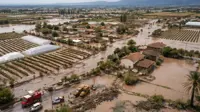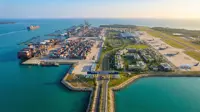UAE cuts federal budget by 1.1% on oil price slump
26 Oct 2015
Oil-rich Gulf state the United Arab Emirates (UAE) has trimmed its next year's spending to 48.5 billion UAE dirham ($13.2 billion), a 1.1-per cent reduction over this year's 49.1 billion, as the plunge in oil prices pushes oil-dependent Gulf economies to tighten their belts.
The federal budget was approved yesterday in a cabinet meeting chaired by the country's vice president and prime minister and ruler of Dubai, Sheikh Mohammed bin Rashid Al Maktoum, the state news agency WAM reported.
''Our priorities in the 2016 budget will be geared towards social development, education and health,'' Sheikh Mohammed said after the meeting.
The UAE economy minister Sultan bin Saeed Al Mansour said the current low oil prices have only had a limited impact on the overall development in the UAE, which, along with the approval of the budget, shows clearly that the UAE succeeded in carrying out flexible and successful policies that will enable it to continue diversification of income and decrease reliance on oil revenue in the future.
''The federal budget was only trimmed by a very small amount,'' the minister said.
The UAE's federal budget accounts for about 14 per cent of all public spending in the country, which also includes the individual budgets of its seven constituent emirates. The emirates are also expected to trim their spending in 2016.
The country depends on oil for more than half of its revenues. Oil revenues have dropped 22 per cent this year.
Oil prices have fallen over 55 per cent from their June peaks of around $110 a barrel to $48 a barrel yesterday for Brent, severely affecting oil-dependent economies across the world.
The IMF recently said that the UAE economy is resilient thanks to its large fiscal and external buffers, safe haven status and economic diversification.
However, lower oil prices and stronger dollar have negative impacts on the economy.
The country is expected to run the first fiscal deficit since 2009, which could be around 4 per cent of GDP, if oil prices remain at current levels, the IMF said.
The IMF called for further fiscal consolidation which includes reducing subsidies and adopting new tax measures, financial stability by strengthening regulation and supervision in the banking sector, pursuing economic diversification by improving business environment and opening up for more foreign direct investment.
The country's energy minister Suhail Al Mazrouei said he wanted to cut a further 3.5 billion dirham from government subsidies.
''A number of Gulf states are looking at ways at which to consolidate. People recognize the new oil prices are here to stay,'' IMF director for the Middle East Masood Ahmed said.


















